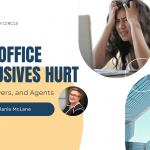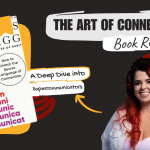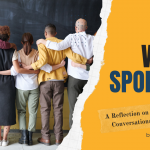DEI has long been focused on the visible, but true inclusion requires considering those aspects that are often left in the background. Mental health and sobriety are two examples of identities that deeply impact how we show up in the world, but they’re rarely part of the DEI discussion.
I’ve learned that inclusion isn’t just about providing a seat at the table; it’s about making sure everyone feels comfortable once they’re there. Whether it’s offering food options for those with dietary restrictions, creating alcohol-free spaces, or making room for quiet spaces for introverts to recharge, inclusion should meet people where they are.
Mental Health as a DEI Priority
Mental health is at the core of how we navigate both our personal and professional lives. However, it’s still often overlooked in professional settings. I’ve witnessed this in many situations—people are expected to power through anxiety or burnout without adequate support. I’ve learned that taking care of our mental health creates a ripple effect that impacts every aspect of our lives, including our business success.
In the real estate industry, where many people face anxiety, depression, and even higher risks of addiction or suicide, we need to be more proactive in offering support. Encouraging self-awareness, finding professional help, and offering resources like Open Path Collective can make all the difference. Mental health is not just a personal matter—it’s a professional one too.
Sobriety and Inclusion: A Personal Perspective
Sobriety is another often-unspoken identity. Many industries, including real estate, are built around socializing with alcohol. Amanda Lott shared her experience navigating this:
“One of the things I think is often ‘unseen’ is the expectation that networking must always happen in environments that are noisy and alcohol-focused, with a lack of spaces that allow for deep, meaningful connections in smaller, quieter settings. There’s still so much work to be done in creating inclusive spaces. And that a Coke or Sprite counts as a non-alcoholic option. It does not.”
Amanda’s journey toward sobriety was challenging, particularly in an industry where so much is centered around bars and drinks:
“It took me a couple years to really feel comfortable being a leader in our industry as a sober person simply because it’s largely driven by solving problems over a drink at the bar, but I definitely found my footing and support in YPN.”
Her experience resonates with me, even though I still drink, I don’t always want to. When we started organizing coffee hours in addition to happy hours at YPN, it wasn’t about taking away from the social events that worked well. It was about expanding our inclusion to give people a choice—a space for meaningful conversation that wasn’t alcohol-centered. This shift allowed more people to participate and connect, including those who wanted to spend time with their families in the evenings, early birds, or simply didn’t drink.
Billie Parott’s story also speaks to the transformation sobriety can bring:
“A friend recently asked me to send a statement about my sobriety. It is then I realized, holy cow, it’s been almost two years since I drank my last glass of wine, cider, beer, and bourbon. Some of the things I noticed is you will lose some friends. But I learned they weren’t your friends to begin with—just drinking buddies.”
“What I noticed most important is I got my life back—my energy, stamina, creativity, and joy for life beyond the alcohol. I can still hang and have an awesome time without drinking. Ask anyone about karaoke nights. Just try and keep up with me on the dance floor.”
Billie’s story reminds us that sobriety doesn’t mean isolation. It means finding new ways to enjoy life and socializing without alcohol. As Billie says, “Ask them out. They may say no, but they may say yes.” Inclusion means considering those who are sober and ensuring they feel just as welcome in social settings.
Dietary Needs: Everyone Deserves a Seat at the Table
Like mental health and sobriety, dietary needs are another often-overlooked identity. I’ve learned through my own experiences how important it is to be mindful of this when planning events. Not everyone can eat the same things, and dietary restrictions are often tied to health, religious beliefs, or personal values.
When planning events, try to make it a point to offer options for vegetarians, those on low-carb diets, or those with gluten sensitivities. Something as simple as having an unbreaded protein at lunch or offering bananas along with muffins at breakfast can make a world of difference for someone with specific needs. This isn’t just about meeting preferences—it’s about making sure everyone can participate fully and comfortably. Besides a well fed person, means a focused person.
True Equity in the Workplace
True equity means considering all needs, visible and invisible. It means creating spaces where people feel they belong, no matter what hidden identities they carry. It’s about understanding that sobriety, mental health, dietary restrictions, and other unseen challenges are just as important as more visible forms of diversity.
And it also means being open-minded. Often, it’s easy to dismiss suggestions that feel too different or “out of the box.” But if we’re truly committed to equity, we need to start by listening—especially to those who may not have had a voice in the past. It’s about more than just doing what’s comfortable or familiar—it’s about making room for everyone.
Conclusion: Seeing the Whole Person
Creating truly inclusive environments means expanding our view of diversity beyond the visible. It means asking questions like: “What does inclusion look like for someone who is sober? For someone managing a mental health condition? For someone with ADHD perhaps? Or For someone with dietary restrictions?” Equity isn’t just a box to check—it’s an ongoing commitment to creating spaces where people can show up as their full selves and feel supported. Whether through offering alcohol-free networking options, acknowledging dietary needs, or providing mental health resources, inclusion is about seeing the whole person and making room for all parts of their identity.
Thank You!
Download Our FREE Inclusive Event Planning Worksheet









Leave a Reply